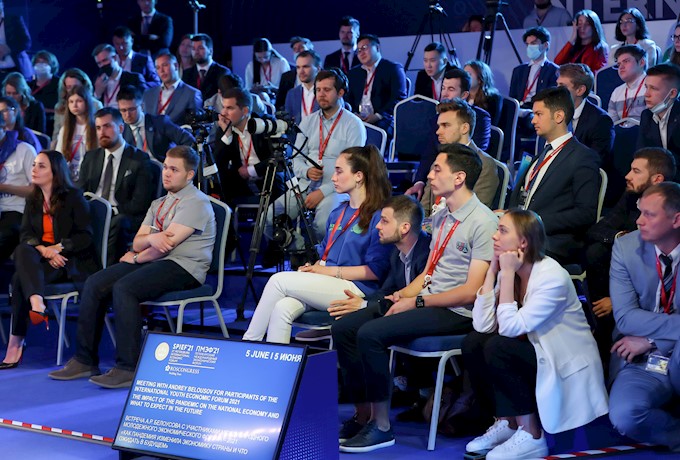
Meeting Between Andrei Belousov And The Participants Of The International Youth Economic Forum 2021 “How The Pandemic Changed The Country’s Economy And What To Expect In The Future”
KEY CONCLUSIONS
The pandemic has rallied the government and the private sector and built a mechanism for efficient communication
“For me, the period is best remembered for the absolutely incredible communications that were built. Never before had there been interaction of this kind with business, either large or small. Never had there been interaction of this kind with the Central Bank. Literally every issue was resolved with a phone call,” First Deputy Prime Minister of the Russian Federation Andrei Belousov.
“The most important thing for us at that moment of lockdown was [at the height of the first wave of the pandemic]: to support SMEs and large enterprises at the centre of the storm. The second was to contain the situation of the unfolding crisis in the core industries and enterprises, so that non-payments did not become an issue,” First Deputy Prime Minister of the Russian Federation Andrei Belousov.
ISSUES
The collapse of the healthcare system in the pandemic
“If there are too many cases to deal with, medical institutions begin to fail. The number of patients increases, the system collapses. […] What happened in Italy? Why Italy? It is a question of municipal medicine; they basically have all these hospitals scattered around the municipalities. Thankfully, we have preserved the model created in Soviet times by People’s Commissar Semashko [the first People’s Commissar of Public Health from 1918 to 1930]; it has changed significantly, though retaining centralization,” First Deputy Prime Minister of the Russian Federation Andrei Belousov.
The return of Russians from abroad
“The last episode occurred for me after the Kathmandu airport had been closed. I was getting 200 climbers out of Nepal, you understand? It took me two weeks. Hands-on, two weeks – negotiations with the Nepalese, organizing flights for Aeroflot, which had never flown there before. Verifying people, bringing them from all over Nepal to the point from where they were to be picked up. There were more than 200 of them. Imagine the scale of the disaster. People are waiting around without any money,” First Deputy Prime Minister of the Russian Federation Andrei Belousov.
Falling oil prices
“Trouble comes in threes. Look what happened at the same time. […] This is the oil price curve. The month of April. The height of our disaster. Oil drops to USD 18 a barrel. Our budget balances at USD 42 per barrel ... And then there is a sharp collapse and fall just at the height of the first wave of COVID,” First Deputy Prime Minister of the Russian Federation Andrei Belousov.
SOLUTIONS
Buying time
“It’s the beginning of 2020. Nothing has happened in the country yet. But we understand perfectly what’s coming. Most likely, it will come from Europe and not China. Because everything is more or less closed up there. At this stage, the risk assessment says that we need to buy time in order to deploy our capacity to combat this infection that no one understands,” First Deputy Prime Minister of the Russian Federation Andrei Belousov.
“There were no masks in the country. Because before that, no one had needed masks. And production takes time – it requires equipment, personnel, materials. Mask production was gradually established. We were occupied with the manual distribution of these masks to those with the most contact with people – doctors, teachers, the police,” First Deputy Prime Minister of the Russian Federation Andrei Belousov.
Inform properly and prevent panic
“In the first months of the pandemic, it was important to exercise tight control over information and respond to fake news and manifestations of panic ... Secondly, we began to control trade very carefully. Hoarding is a sign of panic – people start to buy food, supplies are sharply reduced, suppliers do not have time to deliver ... This means working together with retail chains – we need supplies, excess supplies. For this they need money. We give them money, ‘Guys, just build up your reserves’,” First Deputy Prime Minister of the Russian Federation Andrei Belousov.
Targeted assistance to industries
“We identified areas where tendencies [of the crisis] manifested themselves most rapidly – passenger transportation, those who work with the population. At that time there had yet to be a lockdown, but catering, fitness, trade in non-food products, mainly small business – we understand that they urgently need help. The crisis model differs from 2008–2009, we do not know how long it will last, and so we begin to protect large enterprises, a list of core enterprises,” First Deputy Prime Minister of the Russian Federation Andrei Belousov.
Adjustment of the rouble exchange rate, easing of monetary policy, bank assistance for the budget
“We must give credit to the Central Bank. First, there is, of course, an exchange rate adjustment ... It [the Central Bank] abruptly softens monetary policy at this moment ... made it possible to increase loans. Banks began to increase loans related to debt restructuring, with support for enterprises, and actually took on part of the burden that fell on the budget at that moment. The budget deficit began to grow with terrible speed. They began to finance the economy through borrowing,” First Deputy Prime Minister of the Russian Federation Andrei Belousov.
“Borrowing is at almost 5 trillion; the support package was RUB 2 trillion, with the same amount for 2021. That’s how much we borrowed. This is about the question regarding metallurgists. I personally told Lisin: you raised a ruckus over a few billion roubles with your income growing the way it was. And we burned through RUB 4 trillion [by financing support measures during the pandemic], without taking anything from you, by incurring debt. Then everyone looked sheepish and felt ashamed. There were 30 people, mostly businessmen,” First Deputy Prime Minister of the Russian Federation Andrei Belousov.
For more information, visit the ROSCONGRESS.ORG Information and Analytical System.








